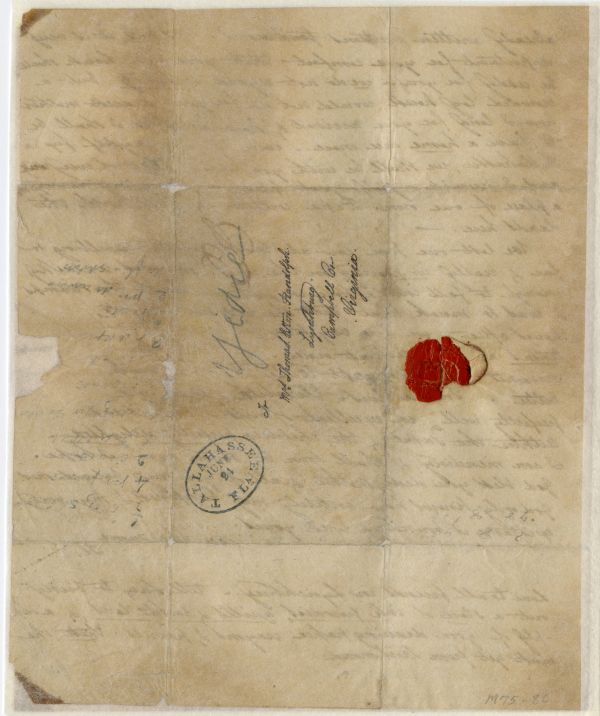Source
State Archives of Florida, Collection M75-86
Description
Letter from Harriet Randolph to her mother, Jane Cary Randolph, describing the journey made in 1829 by members of a prominent Virginia family from Lynchburg, Virginia, to Leon County, Florida. Jane Randolph was still in Lynchburg but preparing to join her daughter in Florida.
General Note
The patriarch of the Randolph family was Thomas Eston Randolph of Dungeness Plantation, who for economic reasons determined in the late 1820s to remove his family from Virginia. Randolph's son-in-law, Francis Eppes, visited Leon County in 1828 and early 1829, and rented and purchased lands on which to establish a plantation. In May 1829, Eppes and his wife, Elizabeth, along with their three children, and Elizabeth's siblings, Harriet and Arthur, left Lynchburg for Florida. The party traveled to Danville, Virginia, then through the Carolinas to Augusta, Georgia. They crossed through Georgia until reaching Thomas County, after which they moved southward into Leon County, Florida. The lands they originally settled on were approximately 11 miles northwest of Tallahassee. Following the arrival of the overland party, another group of Randolphs, including both Thomas Eston Randolph and his wife, Jane Cary Randolph, came to Florida by sea. They left Norfolk on November 1, 1829, and reached the St. Marks River south of Tallahassee on November 18. The two families built up large plantations over the next few years. While Jane Randolph died in 1832, Thomas Eston Randolph lived on until 1842. He helped found the St. John's Episcopal Church and served as U.S. Marshall for Middle Florida. Their son-in-law, Francis Eppes, lived until 1881 and became a prominent member of Tallahassee society.
Mary was slightly affected by the water once for a few hours, & Jeff was one day sick. Nanny's child too was smartly in- -disposed, but the rest of the party were blessed with stomachs not to be affected even by hot rotten lime stone water. Elizabeth felt no ill effect from it, from first to last. I begin to think she is as strong as old Iron himself.
this is a very comfortable house of Francis's, roomy and airy, & quite good looking for a log pen. The floor of our loft (Mary's and mine) is not nailed down, and the seams gape rather more widely than is pleasant, but we have remedied the evil by spreading down your parlor carpet.
the house is on a little eminence, skirting the barrens, but with hammock enough round it for beauty & shade. the yard is fenced in, & nicely cleared up with only a few trees left standing; at the back of it is a fine crop of cotton growing & around the other three sides the most splen -did growth of forest trees I ever beheld. superb oaks covered with the long moss of this country which I cannot describe to you. I never imagined any thing so beautiful & so graceful.
I believe Francis had found everything going on as well as possible. this is a fine country I am sure, & worth the trouble of getting to. dear Mother, it strikes us all now as the perfect absurdity that we should ever have talked of this journey for you. you! I really believe Lucy could not have borne it. no one can, without personal experience form an idea of such an expedition as this. Bonaparte's Russian campaign could not have been harder upon a soldier, than this journey to a delicate woman. I am all impatience to have our building begun. if you do not come out immediately I hope Papa will write, or has




 Listen: The Latin Program
Listen: The Latin Program

